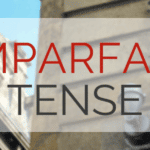
The French conditional tense is what you use to say that one event depends on another event to happen. It’s also used to make polite requests.
The conditional form exists in English, too. Most native speakers don’t consciously think about it, though, because talking about conditionals in English doesn’t involve a distinct conjugation. In English, the word “would” is usually involved.
For example:
“I would have called [conditional tense] my mom if I’d had my phone with me.”
“He would have been [conditional tense] happier if I’d promised to buy him a toy.”
The French conditional tense is also used to make polite requests (vouloir) or polite desires (aimer).
“Would you like to come with me?” (Voudriez-vous venir avec moi?)
“I would love to go with you.” (J’aimerais bien aller avec vous.)
How to Conjugate the French Conditional
In French, the conditional tense (le conditionnel) is a distinct verb tense. It has a verb ending pattern that is the same for every verb.
| Conditional verb endings | |
| (je) -ais | (nous) -ions |
| (tu) -ais | (vous) -iez |
| (il) -ait | (ils) -aient |
Regular French conditional verbs
Conjugation of regular conditional verbs is simple. Simply take the infinitive form and add on the appropriate conditional endings (shown above).
For example:
The verb nager is je nage in present tense and becomes je nagerais in the conditional.
The verb chasser is nous chassons in the present tense and becomes nous chasserions in the conditional.
Here’s an example of a fully conjugated regular verb (marcher, to walk or work) in the conditional tense:
| Marcher | |
| je marcherais | nous marcherions |
| tu marcherais | vous marcheriez |
| il marcherait | ils marcheraient |
Irregular French conditional verbs
Here are common irregular verbs in the French conditional tense. Note that the verb endings always follow the same pattern; it’s just the root forms that are irregular.
For example:
“I would be happy if I had more money.” → Je serais heureux si j’avais plus d’argent.
“We would come home if we had our own room.” → Nous reviendrions à la maison si nous avions notre propre chambre.
As you can see in these sentences, very often the conditional tense is followed by the imparfait tense to explain the conditions that were not met. Make sure you know these conjugations, as well.
| Irregular verb | Conditional root form |
| être | ser- |
| avoir | aur- |
| falloir | faudr- |
| aller | ir- |
| faire | fer– |
| devoir | devr- |
| pouvoir | pourr- |
| savoir | saur- |
| venir | viendr- (same format for devenir and revenir) |
| vouloir | voudr- |
| voir | verr- |
| pleuvoir | pleuvr- |
| valoir | vaudr- |
These same verbs (and root forms) are irregular in the future tense, so you only need to learn one set of irregular verbs and root forms between the two verb tenses.
Spelling changes in French conditional forms
There are a few other verbs that change spelling slightly to accommodate the conditional conjugations while keeping the pronunciation intact.
1) Doubling the final consonant
For example:
Appeler → appeller + conditional ending
Rappeler → rappeller + conditional ending
Jeter → jetter + conditional ending
Projeter → projetter + conditional ending
2) Certain verbs that end in -yer
Replace the y with an i instead. For example:
Common verbs: Essayer, envoyer, ennuyer, nettoyer, payer
Nettoyer → nettoier + conditional ending (je nettoierais)
3) Changing the e to an accent grave è
For verb spellings that would make the second-to-last e not pronounced, the e gets an accent grave è to make it a substantial sound (learn more about French accent marks here).
Common verbs: Amener, promener, lever, acheter, emmener
Promener → promèner + conditional ending (je promènerais)
Next Steps
To master the conditional tense, you should have a good understanding of the imperfect tense. You might also want to read more about the future tense, because its conjugations have several similarities with the conditional.



